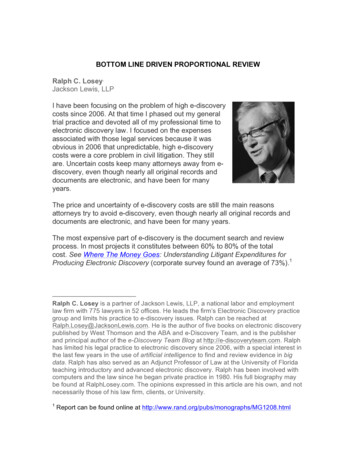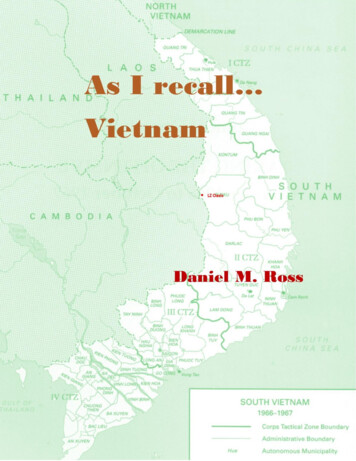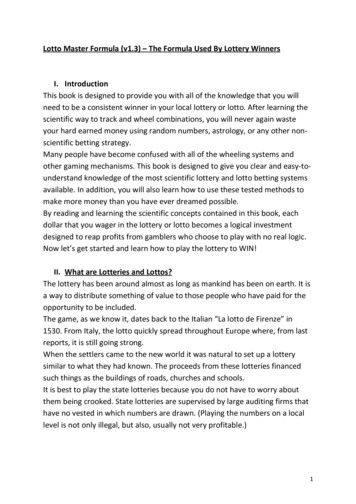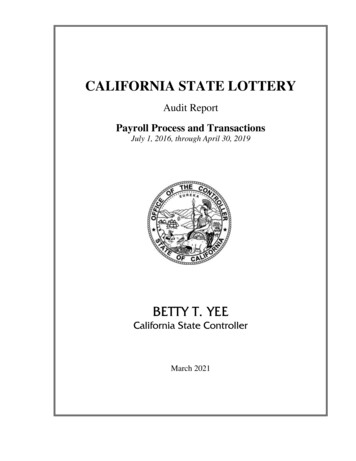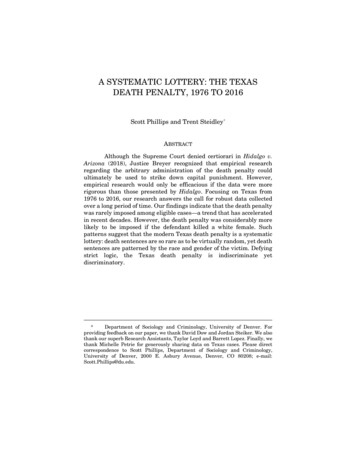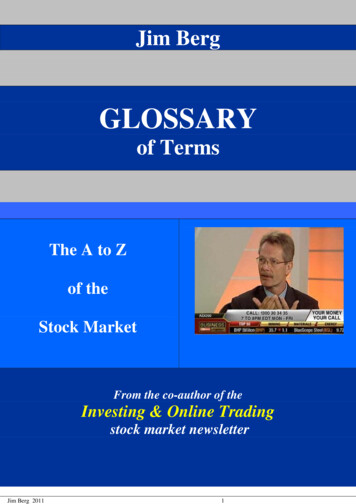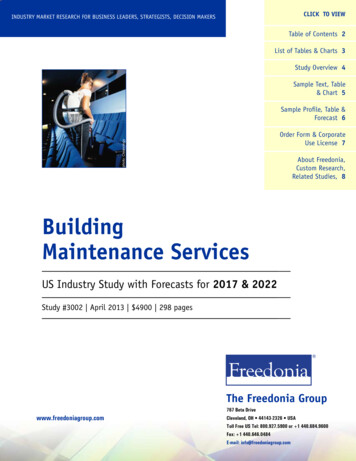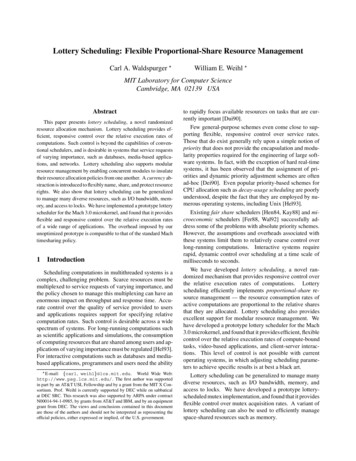
Transcription
Lottery Scheduling: Flexible Proportional-Share Resource ManagementCarl A. Waldspurger William E. Weihl MIT Laboratory for Computer ScienceCambridge, MA 02139 USAAbstractThis paper presents lottery scheduling, a novel randomizedresource allocation mechanism. Lottery scheduling provides efficient, responsive control over the relative execution rates ofcomputations. Such control is beyond the capabilities of conventional schedulers, and is desirable in systems that service requestsof varying importance, such as databases, media-based applications, and networks. Lottery scheduling also supports modularresource management by enabling concurrent modules to insulatetheir resource allocation policies from one another. A currency abstraction is introduced to flexibly name, share, and protect resourcerights. We also show that lottery scheduling can be generalizedto manage many diverse resources, such as I/O bandwidth, memory, and access to locks. We have implemented a prototype lotteryscheduler for the Mach 3.0 microkernel, and found that it providesflexible and responsive control over the relative execution ratesof a wide range of applications. The overhead imposed by ourunoptimized prototype is comparable to that of the standard Machtimesharing policy.1 IntroductionScheduling computations in multithreaded systems is acomplex, challenging problem. Scarce resources must bemultiplexed to service requests of varying importance, andthe policy chosen to manage this multiplexing can have anenormous impact on throughput and response time. Accurate control over the quality of service provided to usersand applications requires support for specifying relativecomputation rates. Such control is desirable across a widespectrum of systems. For long-running computations suchas scientific applications and simulations, the consumptionof computing resources that are shared among users and applications of varying importance must be regulated [Hel93].For interactive computations such as databases and mediabased applications, programmers and users need the ability E-mail: carl, weihl @lcs.mit.edu. World Wide Web:http://www.psg.lcs.mit.edu/. The first author was supportedin part by an AT&T USL Fellowship and by a grant from the MIT X Consortium. Prof. Weihl is currently supported by DEC while on sabbaticalat DEC SRC. This research was also supported by ARPA under contractN00014-94-1-0985, by grants from AT&T and IBM, and by an equipmentgrant from DEC. The views and conclusions contained in this documentare those of the authors and should not be interpreted as representing theofficial policies, either expressed or implied, of the U.S. government.fgto rapidly focus available resources on tasks that are currently important [Dui90].Few general-purpose schemes even come close to supporting flexible, responsive control over service rates.Those that do exist generally rely upon a simple notion ofpriority that does not provide the encapsulation and modularity properties required for the engineering of large software systems. In fact, with the exception of hard real-timesystems, it has been observed that the assignment of priorities and dynamic priority adjustment schemes are oftenad-hoc [Dei90]. Even popular priority-based schemes forCPU allocation such as decay-usage scheduling are poorlyunderstood, despite the fact that they are employed by numerous operating systems, including Unix [Hel93].Existing fair share schedulers [Hen84, Kay88] and microeconomic schedulers [Fer88, Wal92] successfully address some of the problems with absolute priority schemes.However, the assumptions and overheads associated withthese systems limit them to relatively coarse control overlong-running computations. Interactive systems requirerapid, dynamic control over scheduling at a time scale ofmilliseconds to seconds.We have developed lottery scheduling, a novel randomized mechanism that provides responsive control overthe relative execution rates of computations. Lotteryscheduling efficiently implements proportional-share resource management — the resource consumption rates ofactive computations are proportional to the relative sharesthat they are allocated. Lottery scheduling also providesexcellent support for modular resource management. Wehave developed a prototype lottery scheduler for the Mach3.0 microkernel, and found that it provides efficient, flexiblecontrol over the relative execution rates of compute-boundtasks, video-based applications, and client-server interactions. This level of control is not possible with currentoperating systems, in which adjusting scheduling parameters to achieve specific results is at best a black art.Lottery scheduling can be generalized to manage manydiverse resources, such as I/O bandwidth, memory, andaccess to locks. We have developed a prototype lotteryscheduled mutex implementation, and found that it providesflexible control over mutex acquisition rates. A variant oflottery scheduling can also be used to efficiently managespace-shared resources such as memory.
In the next section, we describe the basic lottery scheduling mechanism. Section 3 discusses techniques for modularresource management based on lottery scheduling. Implementation issues and a description of our prototype arepresented in Section 4. Section 5 discusses the results ofseveral quantitative experiments. Generalizations of thelottery scheduling approach are explored in Section 6. InSection 7, we examine related work. Finally, we summarizeour conclusions in Section 8.2 Lottery SchedulingLottery scheduling is a randomized resource allocationmechanism. Resource rights are represented by lotterytickets.1 Each allocation is determined by holding a lottery; the resource is granted to the client with the winningticket. This effectively allocates resources to competingclients in proportion to the number of tickets that they hold.2.1 Resource RightsLottery tickets encapsulate resource rights that are abstract, relative, and uniform. They are abstract because theyquantify resource rights independently of machine details.Lottery tickets are relative, since the fraction of a resourcethat they represent varies dynamically in proportion to thecontention for that resource. Thus, a client will obtainmore of a lightly contended resource than one that is highlycontended; in the worst case, it will receive a share proportional to its share of tickets in the system. Finally, ticketsare uniform because rights for heterogeneous resources canbe homogeneously represented as tickets. These propertiesof lottery tickets are similar to those of money in computational economies [Wal92].2.2 LotteriesScheduling by lottery is probabilistically fair. The expected allocation of resources to clients is proportional tothe number of tickets that they hold. Since the schedulingalgorithm is randomized, the actual allocated proportionsare not guaranteed to match the expected proportions exactly. However, the disparity between them decreases asthe number of allocations increases.The number of lotteries won by a client has a binomialdistribution. The probability p that a client holding t ticketswill win a given lottery with a total of T tickets is simplyp t T . After n identical lotteries, the expected number of2 np(1 ; p). Thewins w is E [w] np, with variance wcoefficient of variation for the observed proportion of winsis w E [w] (1 ; p) np. Thus, a client’s throughputis proportionalpto its ticket allocation, with accuracy thatimproves with n.p1 A single physical ticket may represent any number of logical tickets. This is similar to monetary notes, which may be issued in differentdenominations.The number of lotteries required for a client’s first winhas a geometric distribution. The expected number oflotteries n that a client must wait before its first win isE [n] 1 p, with variance n2 (1 ; p) p2 . Thus, aclient’s average response time is inversely proportional toits ticket allocation. The properties of both binomial andgeometric distributions are well-understood [Tri82].With a scheduling quantum of 10 milliseconds (100 lotteries per second), reasonable fairness can be achieved oversubsecond time intervals. As computation speeds continueto increase, shorter time quanta can be used to further improve accuracy while maintaining a fixed proportion ofscheduler overhead.Since any client with a non-zero number of tickets willeventually win a lottery, the conventional problem of starvation does not exist. The lottery mechanism also operatesfairly when the number of clients or tickets varies dynamically. For each allocation, every client is given a fair chanceof winning proportional to its share of the total number oftickets. Since any changes to relative ticket allocations areimmediately reflected in the next allocation decision, lotteryscheduling is extremely responsive.3 Modular Resource ManagementThe explicit representation of resource rights as lottery tickets provides a convenient substrate for modularresource management. Tickets can be used to insulate theresource management policies of independent modules, because each ticket probabilistically guarantees its owner theright to a worst-case resource consumption rate. Since lottery tickets abstractly encapsulate resource rights, they canalso be treated as first-class objects that may be transferredin messages.This section presents basic techniques for implementingresource management policies with lottery tickets. Detailedexamples are presented in Section 5.3.1 Ticket TransfersTicket transfers are explicit transfers of tickets from oneclient to another. Ticket transfers can be used in any situation where a client blocks due to some dependency. Forexample, when a client needs to block pending a reply froman RPC, it can temporarily transfer its tickets to the serveron which it is waiting. This idea also conveniently solvesthe conventional priority inversion problem in a mannersimilar to priority inheritance [Sha90]. Clients also havethe ability to divide ticket transfers across multiple serverson which they may be waiting.3.2 Ticket InflationTicket inflation is an alternative to explicit ticket transfersin which a client can escalate its resource rights by creatingmore lottery tickets. In general, such inflation should be
disallowed, since it violates desirable modularity and loadinsulation properties. For example, a single client couldeasily monopolize a resource by creating a large number oflottery tickets. However, ticket inflation can be very useful among mutually trusting clients; inflation and deflationcan be used to adjust resource allocations without explicitcommunication.total 20random [0 . 19] 151025Σ 10Σ 15?noΣ 12Σ 15?noΣ 17Σ 15?yes123.3 Ticket CurrenciesIn general, resource management abstraction barriers aredesirable across logical trust boundaries. Lottery scheduling can easily be extended to express resource rights in unitsthat are local to each group of mutually trusting clients. Aunique currency is used to denominate tickets within eachtrust boundary. Each currency is backed, or funded, bytickets that are denominated in more primitive currencies.Currency relationships may form an arbitrary acyclic graph,such as a hierarchy of currencies. The effects of inflationcan be locally contained by maintaining an exchange ratebetween each local currency and a base currency that isconserved. The currency abstraction is useful for flexiblynaming, sharing, and protecting resource rights. For example, an access control list associated with a currency couldspecify which principals have permission to inflate it bycreating new tickets.3.4 Compensation TicketsA client which consumes only a fraction f of its allocated resource quantum can be granted a compensationticket that inflates its value by 1 f until the client starts itsnext quantum. This ensures that each client’s resource consumption, equal to f times its per-lottery win probability p,is adjusted by 1 f to match its allocated share p. Withoutcompensation tickets, a client that does not consume its entire allocated quantum would receive less than its entitledshare of the processor.4 ImplementationWe have implemented a prototype lottery schedulerby modifying the Mach 3.0 microkernel (MK82) [Acc86,Loe92] on a 25MHz MIPS-based DECStation 5000/125.Full support is provided for ticket transfers, ticket inflation,ticket currencies, and compensation tickets.2 The scheduling quantum on this platform is 100 milliseconds.4.1 Random NumbersAn efficient lottery scheduler requires a fast way to generate uniformly-distributed random numbers. We have implemented a pseudo-random number generator based on the2 Our firstlottery scheduler implementation, developed for the Prelude[Wei91] runtime system, lacked support for ticket transfers and currencies.Figure 1: Example Lottery. Five clients compete in a list-basedlottery with a total of 20 tickets. The fifteenth ticket is randomlyselected, and the client list is searched for the winner. A runningticket sum is accumulated until the winning ticket value is reached.In this example, the third client is the winner.Park-Miller algorithm [Par88, Car90] that executes in approximately 10 RISC instructions. Our assembly-languageimplementation is listed in Appendix A.4.2 LotteriesA straightforward way to implement a centralized lottery scheduler is to randomly select a winning ticket, andthen search a list of clients to locate the client holding thatticket. This requires a random number generation and O(n)operations to traverse a client list of length n, accumulatinga running ticket sum until it reaches the winning value. Anexample list-based lottery is presented in Figure 1.Various optimizations can reduce the average number ofclients that must be examined. For example, if the distribution of tickets to clients is uneven, ordering the clientsby decreasing ticket counts can substantially reduce the average search length. Since those clients with the largestnumber of tickets will be selected most frequently, a simple“move to front” heuristic can be very effective.For large n, a more efficient implementation is to usea tree of partial ticket sums, with clients at the leaves.To locate the client holding a winning ticket, the tree istraversed starting at the root node, and ending with thewinning client leaf node, requiring only O(lg n) operations.Such a tree-based implementation can also be used as thebasis of a distributed lottery scheduler.4.3 Mach Kernel InterfaceThe kernel representation of tickets and currencies isdepicted in Figure 2. A minimal lottery scheduling interfaceis exported by the microkernel. It consists of operations tocreate and destroy tickets and currencies, operations to fundand unfund a currency (by adding or removing a ticket fromits list of backing tickets), and operations to compute thecurrent value of tickets and currencies in base units.Our lottery scheduling policy co-exists with the standardtimesharing and fixed-priority policies. A few high-prioritythreads (such as the Ethernet driver) created by the Unixserver (UX41) remain at their original fixed priorities.
list 200100alicecurrencyFigure 2: Kernel Objects. A ticket object contains an amountdenominated in some currency. A currency object contains aname, a list of tickets that back the currency, a list of all ticketsissued in the currency, and an active amount sum for all issuedtickets.4.4 Ticket CurrenciesOur prototype uses a simple scheme to convert ticketamounts into base units. Each currency maintains an active amount sum for all of its issued tickets. A ticket isactive while it is being used by a thread to compete in alottery. When a thread is removed from the run queue, itstickets are deactivated; they are reactivated when the threadrejoins the run queue.3 If a ticket deactivation changes acurrency’s active amount to zero, the deactivation propagates to each of its backing tickets. Similarly, if a ticketactivation changes a currency’s active amount from zero,the activation propagates to each of its backing tickets.A currency’s value is computed by summing the value ofits backing tickets. A ticket’s value is computed by multiplying the value of the currency in which it is denominatedby its share of the active amount issued in that currency.The value of a ticket denominated in the base currency isdefined to be its face value amount. An example currencygraph with base value conversions is presented in Figure 3.Currency conversions can be accelerated by caching valuesor exchange rates, although this is not implemented in ourprototype.Our scheduler uses the simple list-based lottery witha move-to-front heuristic, as described earlier in Section4.2. To handle multiple currencies, a winning ticket valueis selected by generating a random number between zeroand the total number of active tickets in the base currency.The run queue is then traversed as described earlier, exceptthat the running ticket sum accumulates the value of eachthread’s currency in base units until the winning value isreached.3 A blocked thread may transfer its tickets to another thread that willactively use them. For example, a thread blocked pending a reply from anRPC transfers its tickets to the server thread on which it is waiting.bobalicelist 00task3thread4Figure 3: Example Currency Graph. Two users compete forcomputing resources. Alice is executing two tasks: task1 is currently inactive, and task2 has two runnable threads. Bob is executing one single-threaded task, task3. The current values in baseunits for the runnable threads are thread2 400, thread3 600,and thread4 2000. In general, currencies can also be used forgroups of users or applications, and currency relationships mayform an acyclic graph instead of a strict hierarchy.4.5 Compensation TicketsAs discussed in Section 3.4, a thread which consumesonly a fraction f of its allocated time quantum is automatically granted a compensation ticket that inflates its value by1 f until the thread starts its next quantum. This is consistent with proportional sharing, and permits I/O-bound tasksthat use few processor cycles to start quickly.For example, suppose threads A and B each hold ticketsvalued at 400 base units. Thread A always consumes itsentire 100 millisecond time quantum, while thread B usesonly 20 milliseconds before yielding the processor. Sinceboth A and B have equal funding, they are equally likely towin a lottery when both compete for the processor. However, thread B uses only f 1 5 of its allocated time,allowing thread A to consume five times as much CPU,in violation of their 1 : 1 allocation ratio. To remedy thissituation, thread B is granted a compensation ticket valuedat 1600 base units when it yields the processor. When Bnext competes for the processor, its total funding will be400 f 2000 base units. Thus, on average B will winthe processor lottery five times as often as A, each timeconsuming 1 5 as much of its quantum as A, achieving thedesired 1 : 1 allocation ratio.
4.6 Ticket TransfersObserved Iteration RatioThe mach msg system call was modified to temporarilytransfer tickets from client to server for synchronous RPCs.This automatically redirects resource rights from a blockedclient to the server computing on its behalf. A transfer isimplemented by creating a new ticket denominated in theclient’s currency, and using it to fund the server’s currency.If the server thread is already waiting when mach msgperforms a synchronous call, it is immediately funded withthe transfer ticket. If no server thread is waiting, then thetransfer ticket is placed on a list that is checked by theserver thread when it attempts to receive the call message.4During a reply, the transfer ticket is simply destroyed.1510500
lottery scheduling approach are explored in Section 6. In Section7,weexaminerelatedwork. Finally,wesummarize our conclusions in Section 8. 2 Lottery Scheduling Lottery scheduling is a randomized resource allocation mechanism. Resource rights are represented by lottery
